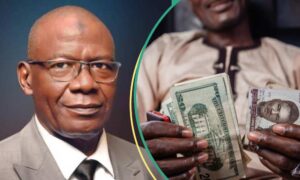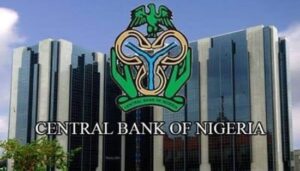Since the National Assembly on Monday transmitted the new National Minimum Wage Bill to President Muhammadu Buhari for assent, the debate has continued on different fronts.
The bill supports N30,000 as the new minimum wage for workers in the country.
On one front, the Nigeria Labour Congress (NLC) hailed the lawmakers’ adoption of the N30,000 recommendation. Nigerian workers say their take-home-pay can no longer take them home.
They say the real value of the current N18,000 minimum wage has since been wiped out by spiralling inflation and soaring cost of living.
Labour Supports Increase
The NLC President, Ayuba Wabba, said although additional N12,000, or 67 per cent increase in the country’s minimum wage is hardly enough to meet even the basic needs of an average worker, it is better than nothing at all.
Considering that the current minimum wage should have been reviewed five years after it came into effect in 2011, Mr Wabba said even the N30,000 package is about three years overdue for a review.
Unlike labour unions, the governors of the 36 states of the federation are opposed to the new minimum wage structure.
They claim their state’s resources cannot accommodate the extra burden of a salary increase.
Although some of the governors have agreed to pay the recommended package, others say they can only pay if they are allowed to downsize their workforce.
Yet, others who find it difficult meeting their obligations to their workers with the current N18,000 minimum wage, insist they cannot pay the new wage.
Informal Sector workers
Beyond the issue of the capacity of the state government to implement the new wage structure, there have also been questions on how the N30,000 minimum wage will impact Nigerians who are not in the public and formal economic sectors.
Concerns have also been raised about whether the N30,000 minimum wage could lead to inflation in the country. To properly situate this argument, one needs to understand inflation to refer to a situation where too much money is chasing fewer goods or services.
The Udoji Award
In September 1974, the Yakubu Gowon administration received the report of the Jerome Udoji panel on Public Service Organisation, Management and Remuneration constituted to review the conditions of service in the public service.
A New York Times report said at the end of the assignment the panel had recommended significant reviews of the salaries and wages of workers in the civil service.
The “Udoji Award” was one of the ways to compensate the workers for standing by the government throughout the civil war years.
However, there was a strong view that the government cannot approve a salary increase for its workers in the public service without recommending the same for their private sector counterparts.
When the recommendations in the report were finally implemented in January 1975, the workers in both sectors received jumbo packages of between 12 to 30 per cent increases in salaries.
Beyond that, the government paid arrears backdated to the years immediately after the civil war.
With the ‘Udoji Award’, there was so much money in the hands of workers in both the public and private sectors. People went into a buying spree. Workers bought and acquired every conceivable thing their imagination could fancy. Money was the problem.
Apart from imported food items, like rice, sugar, canned milk and stock fish, workers acquired latest state-of-the-art electronics, cars, furniture, clothes and other luxury items with the excess money in their possession.
Since the money to pay for the items was not the problem, traders and merchants cashed in on that and adopted various tricks in the book to exploit for profiteering purposes.
Shop owners were accused of hoarding goods to create artificial scarcity to justify the hike in prices of items in the market.
Traders who created the artificial scarcity to make more money were equally made to pay inflated prices for other services they could not produce.
The trader who needed the services of a teacher for his or her children was made to pay inflated prices. And the teacher who has to buy food items to feed his or her family also had to pay more to the market woman for foodstuff.
And the vicious cycle continued, culminating in full-blown inflation that affected not only the workers who earned the Udoji Award but others who did not.
New Minimum Wage And Inflation
The latest minimum wage debate appears different from the Udoji Award era. The proposed N30,000 is coming at a time the country’s economy is already facing difficulties that have seriously devalued the workers take home pay.
Even where the proposal has finally been approved, only N12,000 is what would be added to the existing minimum wage, which is hardly sufficient to scratch the surface of the economic challenges that workers face.
The real value of the package can hardly afford an average worker the basic necessities of life – food, shelter, housing and clothing.
Economists Speak
Economic analysts say N30,000 minimum wage can hardly make up for the high cost of living of the average worker, with the current inflation rate at about 11.31 per cent from about 11.37 per cent last February, according to the National Bureau of Statistics (NBS).
The Central Bank of Nigeria (CBN) governor, Godwin Emefiele, does not believe the proposed increase in the minimum wage will spike inflation. Rather, he says the increase will stimulate output growth in the economy.
<img data-attachment-id="264220" data-orig-file="https://media.premiumtimesng.com/wp-content/files/2018/04/IMG_20180406_190426.jpg" data-orig-size="676,380" data-comments-opened="1" data-image-meta="{"aperture":"8","credit":"","camera":"NIKON D7000","caption":"","created_timestamp":"1497918620","copyright":"","focal_length":"35","iso":"160","shutter_speed":"0.00625","title":"","orientation":"1"}" data-image-title="IMG_20180406_190426" data-image-description="
ANRP Chairman, Tope Fasua
” data-medium-file=”https://i2.wp.com/media.premiumtimesng.com/wp-content/files/2018/04/IMG_20180406_190426.jpg?fit=526%2C296&ssl=1″ data-large-file=”https://i2.wp.com/media.premiumtimesng.com/wp-content/files/2018/04/IMG_20180406_190426.jpg?fit=604%2C340&ssl=1″ src=”https://onlinenigeria.com/wp-content/uploads/2019/03/can-new-minimum-wage-increase-inflation-in-nigeria.jpg” width=”600″ height=”337″ data-original-width=”600″ data-original-height=”337″ itemprop=”http://schema.org/image” title=”IMG_20180406_190426″ alt=”ANRP Chairman, Tope Fasua”>
For Tope Fasua, an Abuja –based economist and chief executive of Global Analytics Consulting Limited, a bit of inflation, although not significant, should be expected if workers’ salaries are increased.
“Naturally if there is a wage increase, a bit of inflation should be expected. But, whatever rise in inflation should not discourage the government from increasing the salaries of workers.
“In other words, you cannot say the proposed increase in workers’ wages will trigger a 5 per cent increase in inflation or thereabout,” he said.
According to Mr Fasua, one of the economic myths in Nigeria is people believing there is more money in the hands of everybody when a certain group of people gets a pay raise.
Therefore, everyone tends to increase prices faster than the effect of inflation, trying to cover up, mindless of the people in the private sector who might not benefit from the proposed increase in public servants’ wages.
“To a large extent, many private sector people cannot be forced to increase their workers’ wages along with the public sector,” he said.
The lead director, Centre for Social Justice (CENSOJ), Eze Onyekpere, said whoever said a new minimum wage will spike inflation has no basic understanding of what inflation really means.
<img data-attachment-id="159312" data-permalink="https://www.premiumtimesng.com/news/159311-group-asks-nigerian-government-halt-scrapping-fiscal-responsibility-commission.html/attachment/eze-onyekpere" data-orig-file="https://i0.wp.com/media.premiumtimesng.com/wp-content/files/2014/04/Eze-Onyekpere.jpg?fit=450%2C300&ssl=1" data-orig-size="450,300" data-comments-opened="1" data-image-meta="{"aperture":"5.6","credit":"","camera":"NIKON D3100","caption":"","created_timestamp":"1394460905","copyright":"","focal_length":"55","iso":"100","shutter_speed":"0.005","title":""}" data-image-title="Eze Onyekpere" data-image-description="
Eze Onyekpere: Lead Director of CSJ,
” data-medium-file=”https://i0.wp.com/media.premiumtimesng.com/wp-content/files/2014/04/Eze-Onyekpere.jpg?fit=450%2C300&ssl=1″ data-large-file=”https://i0.wp.com/media.premiumtimesng.com/wp-content/files/2014/04/Eze-Onyekpere.jpg?fit=450%2C300&ssl=1″ class=”size-full wp-image-159312″ src=”https://onlinenigeria.com/wp-content/uploads/2019/03/can-new-minimum-wage-increase-inflation-in-nigeria-1.jpg” alt width=”450″ height=”300″ srcset=”https://i0.wp.com/media.premiumtimesng.com/wp-content/files/2014/04/Eze-Onyekpere.jpg?w=450&ssl=1 450w, https://i0.wp.com/media.premiumtimesng.com/wp-content/files/2014/04/Eze-Onyekpere.jpg?resize=385%2C256&ssl=1 385w, https://i0.wp.com/media.premiumtimesng.com/wp-content/files/2014/04/Eze-Onyekpere.jpg?resize=303%2C202&ssl=1 303w, https://i0.wp.com/media.premiumtimesng.com/wp-content/files/2014/04/Eze-Onyekpere.jpg?resize=160%2C106&ssl=1 160w, https://i0.wp.com/media.premiumtimesng.com/wp-content/files/2014/04/Eze-Onyekpere.jpg?resize=144%2C96&ssl=1 144w, https://i0.wp.com/media.premiumtimesng.com/wp-content/files/2014/04/Eze-Onyekpere.jpg?resize=140%2C93&ssl=1 140w, https://i0.wp.com/media.premiumtimesng.com/wp-content/files/2014/04/Eze-Onyekpere.jpg?resize=145%2C96&ssl=1 145w, https://i0.wp.com/media.premiumtimesng.com/wp-content/files/2014/04/Eze-Onyekpere.jpg?resize=120%2C80&ssl=1 120w, https://i0.wp.com/media.premiumtimesng.com/wp-content/files/2014/04/Eze-Onyekpere.jpg?resize=100%2C66&ssl=1 100w, https://i0.wp.com/media.premiumtimesng.com/wp-content/files/2014/04/Eze-Onyekpere.jpg?resize=75%2C50&ssl=1 75w, https://i0.wp.com/media.premiumtimesng.com/wp-content/files/2014/04/Eze-Onyekpere.jpg?resize=62%2C41&ssl=1 62w, https://i0.wp.com/media.premiumtimesng.com/wp-content/files/2014/04/Eze-Onyekpere.jpg?resize=50%2C33&ssl=1 50w, https://i0.wp.com/media.premiumtimesng.com/wp-content/files/2014/04/Eze-Onyekpere.jpg?resize=94%2C62&ssl=1 94w, https://i0.wp.com/media.premiumtimesng.com/wp-content/files/2014/04/Eze-Onyekpere.jpg?resize=125%2C83&ssl=1 125w, https://i0.wp.com/media.premiumtimesng.com/wp-content/files/2014/04/Eze-Onyekpere.jpg?resize=137%2C91&ssl=1 137w” sizes=”(max-width: 450px) 100vw, 450px” data-recalc-dims=”1″>
“Whoever says the proposed increase in the minimum wage will spike inflation is an economist without a school. They have no understanding of what inflation is,” Mr Onyekpere said.
“When the National Assembly announced jumbo allowances for its members’ in 2017, what effect did it have on the country’s economy?” he asked.
Rather than increasing inflation, the CENSOJ boss said an increase in the minimum wage will be a great thing to happen to the Nigerian economy, as workers will have more disposable income at hand.
“Buying more will stimulate demand from industries that are producing as well as a lot of inventory in their warehouse,” he said.
He said the benefits of an increased income for the workers will not be limited to salary earners, but also others in the economy (their dependents, relations).
At the end of the day, he said, it will be a win-win scenario for everyone and will also motivate them to improve service delivery.
In his view, social activist, Jaye Gaskia, said he does not see any automatic correlation between the increase in wages and inflation.
“Even if the increase in wage will be inflationary, it will be so little that it won’t affect Nigerians beyond a space of a couple of months.
Mr Gaskia rather blamed the functionality of the Nigerian system for whatever misconception people may have about the proposed increase in workers’ pay.
He said if the minimum wage had been reviewed as and when due, there would not have been a cause for any alarm about inflation.
“Under normal circumstances, the wage increase is supposed to be pegged against rising inflation. So, if our system was working the way it should, the minimum wage of workers should be reviewed about two years ago when it became due.
You may be interested

My Goal Was To Achieve Success With Ten Hag At Man United –De Ligt
Webby - November 14, 2024Netherlands international Matthijs de Ligt has suggested Erik ten Hag didn’t get the breaks he needed to keep his job…

I Want To Take My Game To New Level –Lookman
Webby - November 13, 2024Super Eagles winger Ademola Lookman has reiterated his commitment to take his game to the next level.The Nigerian international, who…

AFCON 2025Q: Benin Republic Hit By Another Injury Blow
Webby - November 13, 2024Benin Republic will be without two more players for their 2025 Africa Cup of Nations qualifying matches against Nigeria and…























![American Pastor, David Wilson Seen Eating The Box Of Woman Who Isn’t His Wife [Video]](https://onlinenigeria.com/wp-content/uploads/2019/10/american-pastor-david-wilson-seen-eating-the-box-of-woman-who-isnt-his-wife-video-150x150.jpg)









